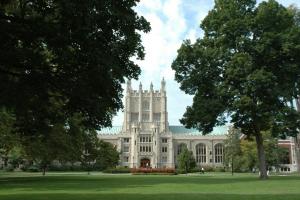The TopUniversities.com guide to higher education news from around the world.
New network for doctoral students in Africa and the EU
The Association of Commonwealth Universities has launched a new virtual network to link PhD students in Europe and Africa. The goal of DocLinks, as it is known, is to address the solitary nature of doctoral studies, encouraging the sharing of resources as well as simply offering a way to deal with the loneliness that can occur. Though
DocLinks will begin as a virtual network, its founders hope that it will lead to more tangible connections in the future. It is supported by the EU’s Erasmus Mundus program, which seeks to further academic links between countries in and around the EU, and six other partners. In future it may be expanded beyond the original two continents.
Full story: University World News
 Survey finds US liberal arts college alumni most satisfied with experience
Survey finds US liberal arts college alumni most satisfied with experience
Accounting for only 3% of the entire US student population, the 130 or so small liberal arts colleges – the best known include Vassar, Amherst and Bowdoin Colleges – which make up the Annapolis Group are some of the most elite institutions in the country. In terms of sticker price they are also some of the most expensive, with annual fees commonly not far shy of US$50,000 (though many have needs-blind admissions policies and are noted for graduating underprivileged students).
Such prices and selectivity must, of course, be justified. Luckily for them a study – albeit one run by the Annapolis Group itself – has found that such colleges produce the graduates who are most satisfied with their time at university. The study compares the experiences of liberal arts college alumni with those of the alumni of 50 top public universities, a wider group of flagship public universities, and private universities. 77% of graduates who attended liberal arts colleges considered their experience to be excellent. This compares to figures of 59% and 56% from publics and privates respectively. They also stated they were better prepared for graduate study, their first jobs, career changes, and life after college in general.
The study has been questioned in that it does not account for the wider range of subjects offered at other universities, or take into consideration that those who gain admittance to such elite schools in the first place are naturally likely to be better equipped for professional life than less academically gifted graduates. Then there’s the fact that the results of the survey will remain academic (if you’ll excuse the pun) for the vast majority of students, as no matter how satisfying an experience these schools offer, they can admit no more than a handful of candidates. However, for those who manage to gain admittance, it seems that they may just be worth the price.
Full story: Inside Higher Education
 Danish think tank calls for higher profile for humanities and social sciences
Danish think tank calls for higher profile for humanities and social sciences
In the run-up to the Danish presidency of the EU, the Danish Business Research Academy (DEA) has released a paper arguing for a consolidation of the position of humanities and social sciences in the EU’s research program for 2014-20. The paper focuses on the potential of these disciplines to drive innovation and business, citing the large proportion of Danish humanities graduates working in the private sector.
Additionally, research that draws together social science subjects (sometimes in combination with natural sciences), argued Gedmund Hernes, a former president of the International Social Science Council, could be a useful way of reassessing the current crises facing Europe. A post-9/11 Cambridge University program – Security in International Society – that draws together political science, history, international relations, economics, theology, psychology and law was given as an example of the potential of the arts, humanities and social sciences to be combined to tackle major international issues.
The DEA are not alone in calling for an increased focus on humanities and social sciences. The UK government made a similar suggestion in May, and in Australia, a key recommendation of a review of centrally funded research called for humanities and social sciences to be given the same priority as STEM (science, technology, engineering and maths) subjects*; though, again, not at the cost of interplay between them.
Full story: University World News
*behind paywall
 China leads India in terms creating world-class institutions, says Yale President
China leads India in terms creating world-class institutions, says Yale President
India may have its famous IITs, but according to Richard C. Levin, President of Yale (the world’s 4th best university according to the QS World University Rankings®), it lags behind China when it comes to creating world-class universities. He noted that India had made its priority widening access (it aims to increase university attendance from 12% to 30% of its population by 2020), rather than competing with the likes of Peking University (ranked 46 in the world), which he predicts will be among the world’s very best in a decade.
India has an advantage, he commented, in that it is ‘free society’, but needs to invest more in research in order to compete. Despite China’s restrictions, it is much more popular with US students at present, due to a higher level of engagement with the US as well as its efforts to bring a group of research-intensive universities into line with the world’s best.
Levin was in India to explore the possibility of establishing a partnership, but ruled out setting up an Indian campus. He did, however, suggest that American universities would certainly be interested in doing so once the long-delayed Foreign Education Providers Bill, which would allow them to do so, was passed.
Full story: Hindustan Times
Heriot-Watt University to set up shop in Malaysia
A £20 million tender to build a campus in Malaysia, offered jointly by the Malaysian government and private corporation Putrajaya Holdings, has been won by Scottish institution, Heriot-Watt University. The branch campus will play host to a total of 4,000 undergraduate and graduate students and is due to open in 2014.
This will be the Edinburgh-based university’s second branch campus. The first is in Dubai, and opened in 2005. Between this campus and distance learning programs, the university offers provision to 13,000 students beyond the 8,000 based at its home campus.
The tender reflects Malaysia’s ambitions to move from middle to high-income country status, according to the CEO of Putrajaya Holdings. Along with other ASEAN nations (Indonesia, Malaysia, Philippines, Thailand, and Vietnam), Malayisa has enjoyed strident economic growth in recent years.
